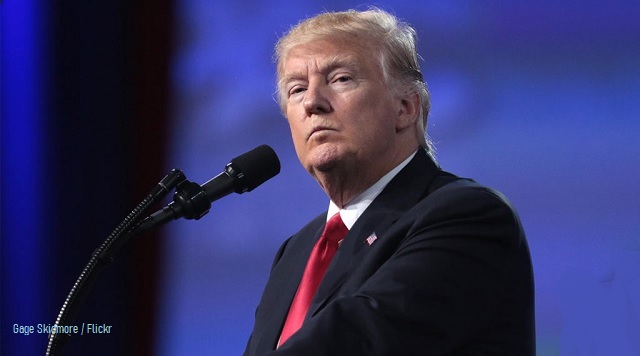Trump’s Indictment Damages the U.S. in World Politics

A fundamental aspect of politics is that domestic events impact international ones and the reverse.
U.S. House of Representatives Speaker Kevin McCarthy’s meeting with Taiwan President Tsai Ing-wen deserves praise for demonstrating that the House leadership stands with Taiwan. That is an important deterrent message to communist China as its leader, Xi Jinping, weighs his consideration of an attack against Taiwan.
Half a world away, New York prosecutor Alvin Bragg’s indictment of former President Donald Trump is another seemingly wholly domestic event. But it is not solely a domestic matter—it has major international consequences for U.S. global interests, its allies and partners, and its enemy, the Chinese regime.
The United States is a valuable ally for three reasons.
First, due to its power, it possesses the military, diplomatic, and economic might to advance the interests of allies and partners for security and prosperity.
Second, the United States is also respected and prized as an ally due to the health of the U.S. political system. Global allies and partners understand that the United States has been a reliable ally since it entered World War II in 1941.
To be sure, at times of domestic political turmoil, U.S. credibility has waned, as former President Richard Nixon’s fall due to Watergate emboldened China in 1974 to conquer from South Vietnam all of the Paracel Islands. A year later, it did the same for North Vietnam. Hanoi knew that the United States was paralyzed, and so it could conquer South Vietnam without fear of U.S. intervention to save Saigon.
The “fear of another Vietnam” hindered the U.S. response to the Cambodian genocide, the Angolan civil war, the Iranian Revolution, Somoza’s overthrow in Nicaragua, and support for El Salvador’s effort to defeat a communist insurgency. Most importantly, it aided the expansion of the Soviet Union and Soviet Bloc power in the Third World. In the 1980s, it also weakened Washington’s ability to support insurgents fighting Soviet-supported regimes.
Third, the United States is an example to the world due to its ideology and political culture. The Washington Consensus model of democratic governance, free market capitalism, and low levels of political and economic corruption serve as the template for developing states to follow, unites allied governments, and distinguishes the United States from its adversaries. Washington’s model for the world demonstrates that states can be democratic, prosperous, and stable—all of which provide better allies for the United States and better protection for human rights.
Thus, the U.S. example is important for the values that the country projects but also as a political lodestar. It is a force multiplier in ideological warfare with China. This is significant as the Chinese Communist Party (CCP) has realized that its grand strategic goal of dominance is hindered by the absence of a strategic narrative that will allow it to advance its ambitions while minimizing balancing and other forms of resistance against it. Beijing’s new strategic narrative, the “common destiny of mankind” or Xi’s Global Civilizational Initiative announced in March is intended to advance that aim and legitimize the CCP’s tyrannical surveillance state as the model for world governance. Thus, as it did during the Cold War, the world has two competing ideologies and worldviews.
Although these considerations were probably far from the minds of those who authorized the indictment of a former president, that act weakens that distinction and violates American principles and political culture. The world expects Xi to employ every means against his domestic political enemies. The United States is different. Its political culture did not allow current presidents to indict their political enemies, particularly a former and possible future president. Those who came close to violating this understanding—however indirectly like Nixon’s cover-up after the Watergate break-in—were disgraced and hounded from office.
The political culture and history of the United States forbade such an act. Now it seems possible, thus eroding important distinctions between the United States and most countries. U.S. political principles and culture are thus eroded. The distinction between the political systems and their respective claims to global leadership is not as sharp as before.
Through the indictment against a former president, the Biden administration has handed the CCP a weapon to expand its influence in international politics and challenge the position and legitimacy of liberal democracy in the minds of the Chinese people and others around the world.
The indictment and likely trial, and possible additional indictments in other cases in Georgia and by the Special Counsel for Trump Inquires, Jack Smith, have multifaceted domestic effects that will play out between now and the Republican Party nomination process, and if Trump is the nominee, to November 2024. Moreover, these events have myriad and adverse international ones. The great strength of the United States in its competition with communist China is that its ideology, political culture and values, rule of law, and respect for human rights stand in direct contrast to an odious and repressive regime that is the CCP.
No administration should be allowed to jeopardize U.S. values and global image. The Biden administration did this with a raid on Mar-a-Lago in August 2022 and by not stopping the indictment. The administration just gave the CCP an unearned and undeserved victory in the ideological fight. The raid at Mar-a-Lago, the indictment against Trump, and his future trial, likely in January 2024, now have a life and legacy in global politics that is to the detriment of the United States and its allies in the struggle against the Chinese regime.
Originally published by the Epoch Times
AUTHOR
Bradley Thayer
Director of China Policy
RELATED ARTICLES:
Military expert warns China is waging low-level war on America
Stop US enabling of CCP belligerence
Securing America – A look inside the mind of Vladimir Putin
Donald Trump by Gage Skidmore is licensed under CC BY-SA 2.0
EDITORS NOTE: This Center for Security Policy column is republished with permission. ©All rights reserved.


Leave a Reply
Want to join the discussion?Feel free to contribute!